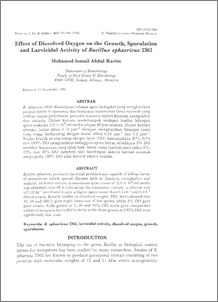Citation
Abdul Karim, Mohamed Ismail
(1996)
Effect of Dissolved Oxygen on the Growth, Sporulation
and Larvicidal Activity of Bacillus sphaericus 2362.
Pertanika Journal of Science & Technology, 4 (2).
pp. 191-196.
ISSN 0128-7680
Abstract
Bacillus sphaericus produces bacterial protein toxin capable of killing larvae of mosquitoes which spread diseases such as filariasis, encephalitis and
malaria. In batch culture, a maximum spore count of 2.9 x 109/ml media was obtained after 48 h cultivation. In continuous culture, a dilution rate
of 0.10 hr- I was found to give a higher spore count than 0.15 h- 1 and 0.2 h- I dilution rates. Kinetic studies on dissolved oxygen (DO) levels showed that
20,50 and 100% gave rapid formation of free spores, whilst 5% DO gave
poor results. Cells grown at 5, 20 and 50% DO levels gave comparable
values of mosquito-larvicidal activity while those grown at 100% DO were
significantly less toxic.
Download File
![[img]](http://psasir.upm.edu.my/style/images/fileicons/application_pdf.png)  Preview |
|
PDF
Effect_of_Dissolved_Oxygen_on_the_Growth,_Sporulation.pdf
Download (2MB)
|
|
Additional Metadata
Actions (login required)
 |
View Item |

